Israel's Defense Minister Asks For Higher Budget, Citing Iran
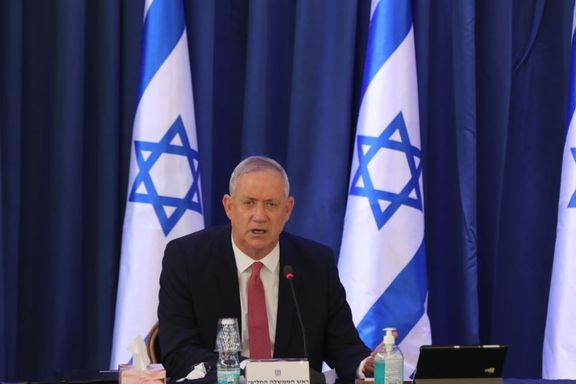
Israeli Defense Minister Benny Gantz has appeared before a key Knesset committee to argue for a higher defense budget, citing Iran as the major threat.

Israeli Defense Minister Benny Gantz has appeared before a key Knesset committee to argue for a higher defense budget, citing Iran as the major threat.
Gantz said the most significant threat Israel faces is Iran and its nuclear program, adding the armed forces need the means to confront the danger.
“We see that Iran is advancing toward the level of enrichment that would allow it, when it wished, to become a threshold state — and we are making every effort to prevent that. We will invest in our offensive and defensive capabilities, improve our technological superiority, and accelerate our efforts to ensure that — even though Iran is foremost a global and regional challenge — Israel will always have the ability to defend its citizens with its own forces,” The Times of Israel quoted him as saying.
Israel’s channel 12 reported Monday that a budget of roughly $1.5 million is being allocated to procure the necessary weapons to confront Iran if it refuses to return to nuclear talks with Western powers.
Gantz also said that a higher budget is needed for a two-front war, a possible reference to a conflict with Palestinian groups in Gaza or with the Lebanese Hezbollah, both backed by Tehran.

The leader of Lebanon's Iran-backed Hezbollah has declared for the first time on Monday that his powerful militant group has 100,000 trained fighters.
Hassan Nasrallah disclosed the size of the Shiite group's militant arm in his first speech since seven people were killed in gun battles on the streets of Beirut on Thursday.
The confrontation erupted over a long-running probe into last year's massive port blast in the city.
Verifying the numbers of the largely secretive militant group is difficult. If true, it would be larger than Lebanon's armed forces, estimated to at about 85,000. Nasrallah’s claim could also be a scare tactic against opponents in Lebanon.
Hezbollah is also present in Syria, where it has been fighting as part of an array of Iranian-backed forces to help save Bashar al-Assad from his opponents in the civil war.
Thursday's clashes saw gunmen battling each other for several hours with automatic rifles and rocket-propelled grenades in the streets of Beirut.
It was the most violent confrontation in the city in years, echoing the nation's darkest era of the 1975-90 civil war.

With Iran nuclear talks stalled, Israel reportedly appropriated $1.5 billion to prepare for a potential strike at Iran, as US tested a new bunker-buster bomb.
Israel’s Channel 12 reported Monday that the additional money set to be approved by the government in November, would pay for aircraft, intelligence-gathering drones and armaments needed for a strike against hardened Iranian nuclear targets.
US officials, including Secretary of State Antony Blinken have mentioned “other options” if Iran refuses to return to nuclear talks. Tehran suspended the Vienna negotiations in June after the election of Ebrahim Raisi (Raeesi), a hardliner handpicked by Supreme Leader Ali Khamenei.
Although ‘other options’ could mean taking Iran’s case to the UN Security Council for imposing international sanctions, or simply augmenting US sanctions, Israel has been much more adamant that Tehran’s nuclear program should be stopped at any cost. Estimates vary about when Iran could reach the nuclear threshold for a bomb, but both the West and regional countries are concerned that Tehran is building up its stockpile of enriched uranium, while refusing to negotiate.
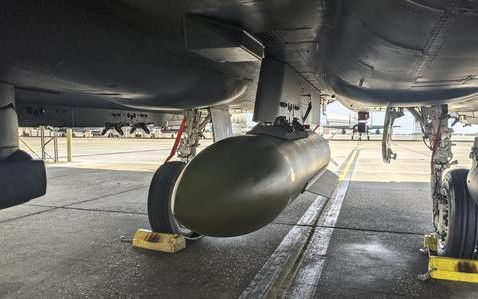
Israeli officials have warned on several occasions since August that if no options are left they would "go it alone" to stop Iran from acquiring nuclear weapons. That could mean that Israel might not even tolerate Iran becoming a "threshold state", meaning having all the components for a bomb but not actually deploying one.
The US Air Force reported on October 13 that a new 5,000-pound bunker-buster munition was successfully tested by an F-15E Strike Eagle warplane on October 7. This means that the bomb can be launched from fighter planes and could be potentially used by Israel. The GBU-72 Advanced 5K Penetrator was released from 35,000 feet and hit a designated area “surrounded by blast pressure sensors and fragment-counting equipment,” which helps to determine the weapon’s lethality, the Air Force said.
Channel 12 speculated that the US Air Force test was meant to be a warning to Iran not to avoid the nuclear talks. Last week, Iran said it wants to hold discussions with the European Union in Brussels before any return to the main nuclear negotiations, but the State Department on Monday dismissed the idea, saying such talks are not needed. Apparently, Tehran wanted to start a new negotiating tactic that would exclude Washington. In the Vienna Talks the US was present and negotiated indirectly with Iran.
Any conflict with Iran could easily escalate into a separate war with the Lebanese Hezbollah Shiite militant group. A senior Israeli military official said on Monday that Hezbollah can fire 2,000 rockets a day at Israel if conflict breaks out. The group’s leader Hassan Nasrallah also warned his opponents in Lebanon that it has 100,000 fighters, after a brief gun battle in Beirut last week.
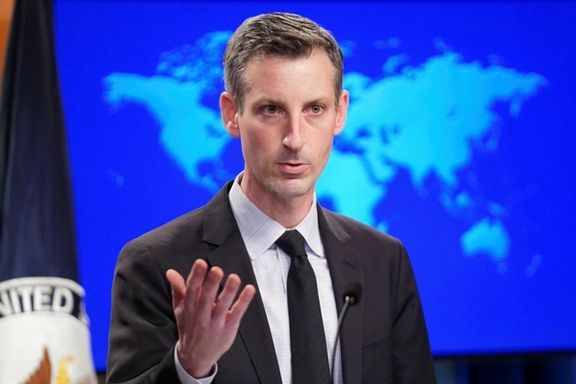
Talks in Brussels are not necessary before the resumption of indirect nuclear talks with Iran in Vienna, State Department spokesperson Ned Price said Monday.
Reference to possible talks in Brussels with the EU emerged after the visit of European Union's chief negotiator Enrique Mora to Tehran on October 14.
Reports in Iranian media on Sunday suggested a possible meeting in Brussels, but the European Union's foreign policy chief Josep Borrell played down the chance of any talks outside of Vienna earlier on Monday.
Iran has said it wants to review documents from the first six rounds of talks with EU in Brussels, but that would not be different from negotiations and would effectively leave Washington out of the process for an agreement to revive the Joint Comprehensive Plan of Actions, JCPOA.
Iran has been refusing to return to the Vienna talks that began in April and were suspended in June when Tehran said its new president needed time to form a government. In the meantime, Iran continues to enrich uranium up to 60 percent, getting closer to having enough fissile material for a bomb.
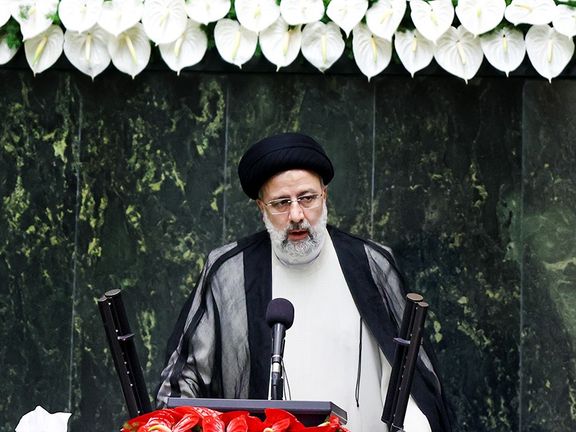
Iran's hardline President Ebrahim Raisi said on Monday that the US should lift sanctions, as Tehran has refused to return to nuclear talks since in June.
"We are serious about result-oriented negotiations. ... If Americans are serious, they should remove unjust sanctions on Iran," Raisi told state TV.
In April, Iran and six powers started talks to reinstate the deal that then-US President Donald Trump ditched three years ago and reimposed sanctions that have squeezed Iran's oil exports.
The talks in Vienna were meant to agree on a process for both sides to return to the 2015 agreement (JCPOA), which would involve lifting of US sanctions, and for Iran stopping violations of the deal.
But the talks were put on hold after Raisi's election in June. Western powers have urged Iran to return to negotiations, warning that time is running out as Tehran's nuclear program is advancing well beyond limits of the nuclear pact.
In response to Trump's reimposition of sanctions, Tehran has breached the deal by rebuilding stockpiles of enriched uranium, refining it to higher fissile purity and installing advanced centrifuges to speed up output.
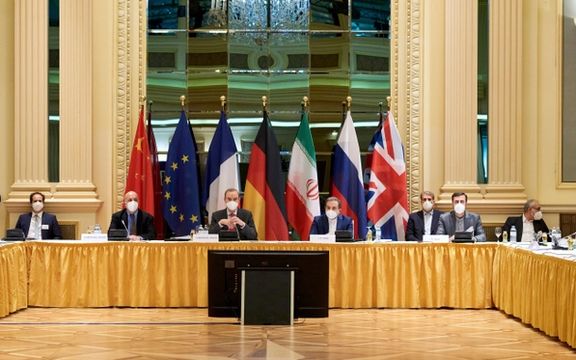
In confirming Monday their diplomats would meet in Brussels to review Iran’s stalled nuclear talks, EU foreign policy chief and Iran’s foreign ministry did not name a day.
For the European Union, Josep Borrell declined to confirm reports − citing an Iranian parliamentarian − that the meeting would be Thursday.
In Tehran, Saeed Khatibzadeh, spokesman of the foreign ministry, said that after a “constructive” visit last Thursday by Enrique Mora, the EU political director who coordinates the Vienna talks, Iran’s discussions with Europe would “continue in a few days in Brussels.”
The Vienna talks began in April but were suspended in June pending the Iranian presidential election and transition, but since then Iran has refused to return to negotiations. Aiming to restore Iran’s 2015 nuclear deal with world powers (the JCPOA, Joint Comprehensive Plan of Action), the talks failed to agree which United States sanctions needed to be lifted for Washington to return to the deal, which it left it 2018, and how Iran should bring its nuclear program back within JCPOA limits.
Neither the EU nor Iran has explained why they intend to liaise in Brussels. The Vienna talks formally involve all remaining parties to the JCPOA – China, France, Germany, Iran, Russia, and the United Kingdom – with the US taking part indirectly.
Asked about the future of the process as he arrived for an EU foreign ministers meeting in Luxembourg Monday, Borrell said he was “more optimistic today than yesterday.”
"No confirmation yet, but things are getting better and I am hopeful we will have preparatory meetings in Brussels in the days to come," he said.
New arrangement
In Tehran Khatibzadeh confirmed that the foreign ministry would continue to lead Iran’s diplomacy on the nuclear issue but with “a new arrangement.”
Asked if Ali Bagheri-Kani would take over the role as lead negotiator of Abbas Araghchi, whom he has replaced as a deputy foreign minister under President Ebrahim Raisi (Raeesi), Khatibzadeh confirmed Bagheri-Kani would lead the Iranian side in Brussels.
“Mr Bagheri will in his first opportunity present his views [opinions] to the European side,” Khatibzadeh explained.
A growing sense of urgency in European over the negotiations result results partly from concerns that the Raisi administration, which includes long-term critics of the JCPOA, will toughen Iran’s approach and partly from the experience Iran is gaining with an expanded nuclear program, which could undermine the non-proliferation calculations underpinning the 2015 agreement.
Khatibzadeh insisted that the onus in the nuclear talks lay in Washington. He also expressed Iran’s concerns over the value of any US commitments, given previous US president Donald Trump left the JCPOA unilaterally in 2018 and imposed ‘maximum pressure’ sanctions.
“All talk has been aimed at bringing back the US without preconditions to commitment to 2231,” he said, citing the United Nations Security Council resolution that endorsed the JCPOA.
“Our main goal is to make sure that all sanctions are ended and that decisions cannot be changed by anyone in Washington and there will be no games played against us. This can be achieved only in concrete talks.”
Discussions in Brussels, the spokesman said, would consider “the challenges and obstacles that were not bought to a conclusion (resolved) in Vienna.”